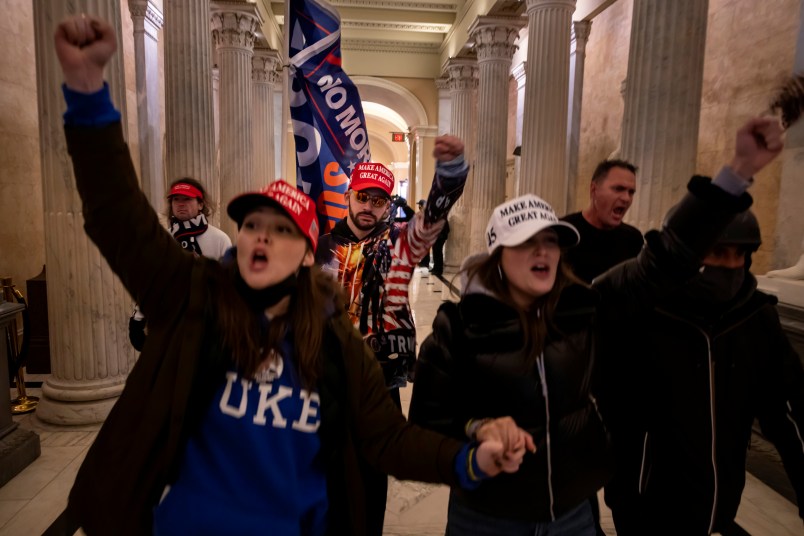The conservative Supreme Court justices shifted between a series of positions during Tuesday’s oral arguments, seemingly probing for a way to at least narrow an obstruction charge that the government has used against over 300 Jan. 6 rioters.
The statute, which forbids obstructing an official proceeding, grew out of the Enron scandal and specifically addresses destruction of evidence. A second, broader clause of the statute, the government argued, applies to the insurrectionists’ attempts to scuttle Congress’ certification of the Electoral College vote in 2021.
Government prosecutors argued that the insurrectionists fall under the catchall provision — anyone who “otherwise obstructs, influences, or impedes any official proceeding.” Joseph Fischer, the alleged insurrectionist whose case Tuesday’s argument grew out of, countered that it’s an overbroad read of a statute fundamentally about evidence impairment.
Justices Samuel Alito and Neil Gorsuch used a range of hypotheticals — pointedly including recognizable conduct by liberals — to demonstrate the supposed breadth of the obstruction statute, and to downplay an argument deployed by the government: the insurrection was a singular moment in American history that does not invite easy comparisons.
“What happened on January 6 was very, very serious, and I’m not equating this with that,” Alito said, before citing Monday’s pro-Gaza protest on the Golden Gate bridge and stringing together a hypothetical where a similar protest blocks members of Congress from getting to a vote.
“Would pulling a fire alarm before a vote qualify for 20 years in federal prison?” Gorsuch asked incredulously, clearly alluding to Rep. Jamaal Bowman (D-NY).
Justice Clarence Thomas, too, tried to handwave away the seriousness of the insurrection, an even more striking position — coupled with his lack of recusal from the case — given his wife Ginni Thomas’ enthusiastic activism on behalf of Donald Trump as the defeated former president tried to overturn the 2020 election.
“There have been many violent protests that have interfered with proceedings,” he said to Solicitor General Elizabeth Prelogar, questioning whether the government has applied the anti-obstruction provision to those as well — and implying that it’s wrongly pulling out a special weapon for this case.
Tuesday’s case was one of the first times we heard the conservatives give their perspective on the insurrection, which at times seemed to fall in line with most right-wing politicians’ — yada yada yada-ing its particular severity and danger, and mentioning the rioters and other, peaceful protesters in the same breath.
Still, the outcome of the anti-obstruction clause case is less easily predictable than other recent arguments, where the conservatives reflexively arrayed against the government’s position. But most seemed inclined, at least, to narrow the statute from how the Justice Department wanted to use it.
Justice Brett Kavanaugh did a two-step, both questioning why the other charges brought against this particular alleged insurrectionist aren’t enough to satisfy the Department of Justice’s bloodlust, and potentially lessening the blowback by reminding the audience that tossing out the obstruction charge doesn’t nullify the whole case against Fischer.
“Why aren’t those six counts good enough from the Justice Department’s perspective, given that they don’t have any of the hurdles?” he asked after ticking off the other charges. He also broke in to point out that the contested charge has the highest maximum penalty of those Fischer faces.
Prelogar responded that the other charges “don’t fully reflect the culpability of petitioner’s conduct on January 6,” citing a message Fischer sent that members of Congress “can’t vote if they can’t breathe.”
Chief Justice John Roberts and Justice Amy Coney Barrett focused their energy on fretting over the breadth of the statute. In an unusual pairing, they were joined in their concerns by Justice Ketanji Brown Jackson, whose public defender background may make her more inclined to narrowly read statutes used against criminal defendants.
The case will have ramifications beyond Fischer’s prosecution. A few hundred rioters have also been charged under the statute. And special prosecutor Jack Smith, in the Jan. 6 case against Trump, also grounded two of his charges in the same reading of this anti-obstruction provision.
Perhaps reading the writing on the wall, Smith’s already submitted briefs arguing that those charges persist even if the justices decide that the insurrection was not obstruction of an official proceeding, pointing to the fake electors scheme. The attempt to use “fraudulent electoral certifications rather than genuine ones” even more explicitly hooks into the law’s prohibition of document tampering, he wrote.
While it’s hard to take much comfort in the statements of a results-oriented, right-wing Court, Smith may have found some solace in Tuesday’s arguments even amid the hesitancy about the broader reading of the anti-obstruction statute. The justices accepted at face value that it covers messing with physical evidence, possibly charting a path to a Smith win despite a potential DOJ loss.







But her e-mails…never fails to amuse. McConnell is another whose obituary I look forward to reading.
If the rioters were black they’d all be dead.
Surveillance footage of a guy pulling a fire alarm:
I suppose it’s too much to ask these Justices to conduct themselves like Americans rather than Republicans. America will have to get its head around having its top court sympathetic with and accommodating of folks that tried to overthrow the joint. But…that is the way it is.
What part of “any official proceeding” don’t the justices understand? I guess if you have been bought and paid for by the Federalist Society, you stay bought and paid for.